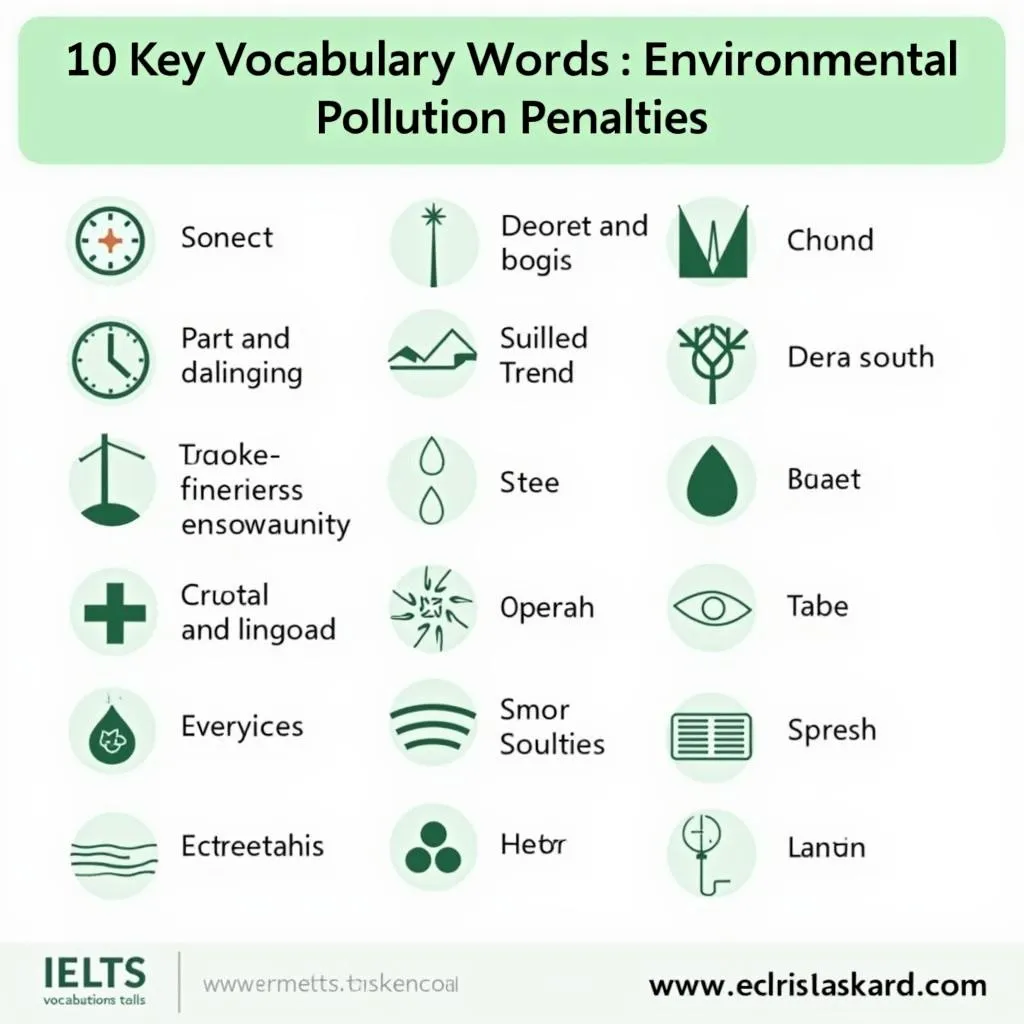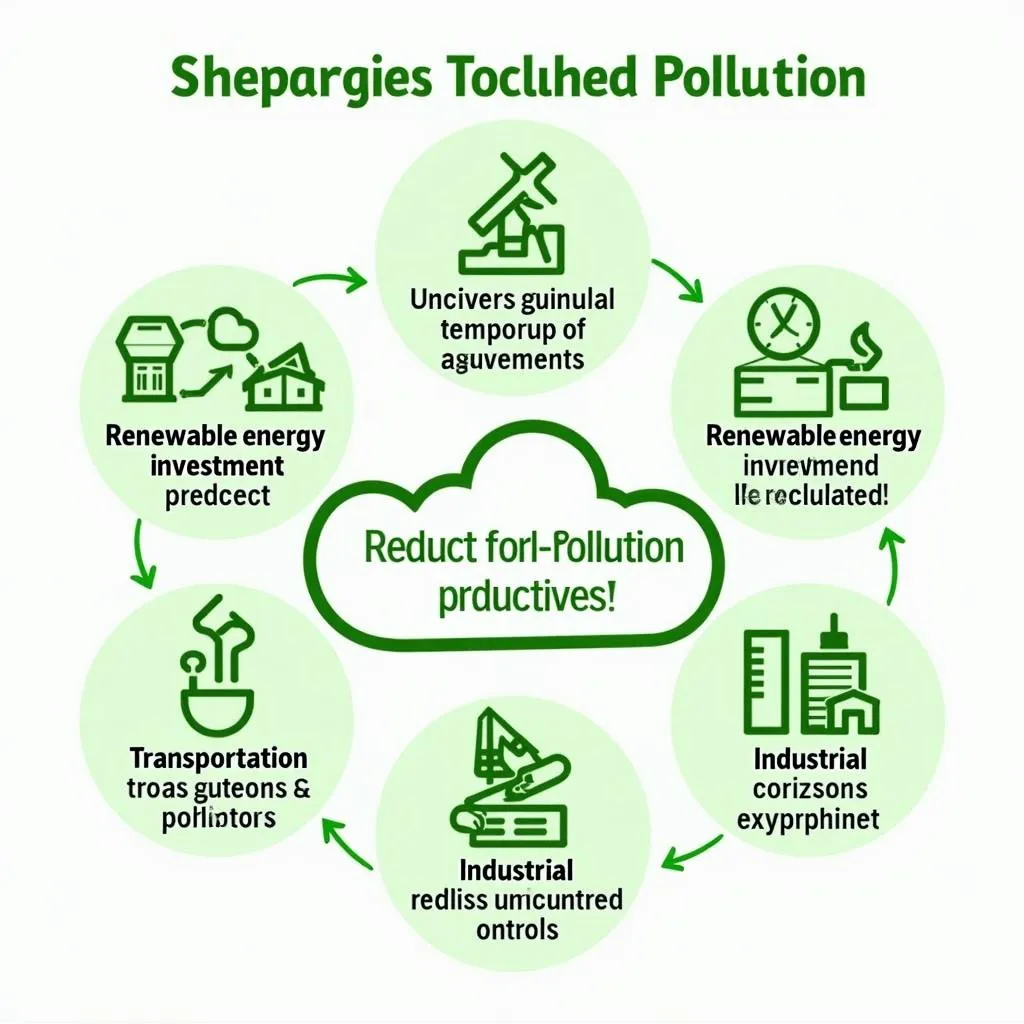Environmental protection is a crucial topic in IELTS Writing Task 2, with questions about pollution and governmental actions frequently appearing. One recurring theme is the debate over stricter penalties for environmental polluters. Let’s examine a relevant question that has appeared in past IELTS exams and is likely to resurface in future tests.
Nội dung bài viết
Some people believe that governments should impose stricter penalties on companies and individuals who pollute the environment. To what extent do you agree or disagree?
Analyzing the Question
This question requires you to express your opinion on whether governments should enforce harsher punishments for environmental polluters. Key points to consider:
- The scope includes both companies and individuals
- The focus is on “stricter penalties,” implying existing penalties are insufficient
- You need to state your level of agreement or disagreement
- Provide reasons and examples to support your stance
Sample Essays
Band 9 Essay
Environmental degradation is a pressing global concern, and the role of governments in curbing pollution is a topic of heated debate. While some argue for stricter penalties on polluters, I firmly believe that this approach is not only necessary but crucial for safeguarding our planet’s future.
Firstly, imposing harsher punishments on companies and individuals who harm the environment serves as a powerful deterrent. When faced with the prospect of severe fines or legal consequences, businesses are more likely to invest in cleaner technologies and adopt sustainable practices. For instance, in Germany, stringent environmental regulations have led to a significant reduction in industrial emissions, with many companies pioneering eco-friendly innovations to avoid penalties.
Moreover, stricter penalties reflect the true cost of environmental damage to society. Pollution often results in long-term health issues and ecological imbalances, costs that are typically borne by the public rather than the polluters themselves. By implementing more severe consequences, governments can ensure that those responsible for environmental harm are held accountable for the full extent of their actions. This approach aligns with the “polluter pays” principle, which has been successfully implemented in countries like Sweden, where it has led to improved waste management and reduced pollution levels.
However, it is essential to acknowledge that penalties alone are not sufficient. Governments should complement stricter enforcement with education programs and incentives for sustainable practices. This balanced approach can foster a culture of environmental responsibility while providing support for individuals and businesses transitioning to greener alternatives.
In conclusion, I strongly agree that governments should impose stricter penalties on environmental polluters. This measure, combined with educational initiatives and incentives, can effectively combat pollution and promote a more sustainable future for our planet. The urgency of the environmental crisis demands decisive action, and stringent penalties are a crucial tool in this endeavor.
(Word count: 298)
 IELTS Writing Task 2 essay on environmental pollution penalties
IELTS Writing Task 2 essay on environmental pollution penalties
Band 7 Essay
In recent years, environmental pollution has become a major concern worldwide. Some people argue that governments should implement more severe punishments for those who pollute the environment. I partially agree with this viewpoint, as stricter penalties can be effective, but they should be part of a broader strategy to address environmental issues.
On one hand, harsher penalties for polluters can serve as a strong deterrent. When companies and individuals face significant fines or legal consequences for environmental violations, they are more likely to take precautions and invest in cleaner technologies. For example, in some European countries, strict regulations on industrial emissions have led to a notable decrease in air pollution levels. This demonstrates that the threat of severe punishment can motivate positive changes in behavior.
However, relying solely on penalties may not be the most effective approach. Instead, governments should adopt a comprehensive strategy that combines punishments with education and incentives. By raising awareness about environmental issues and providing support for sustainable practices, authorities can encourage voluntary compliance and foster a culture of environmental responsibility. For instance, offering tax breaks for companies that adopt green technologies can be a powerful motivator for change.
Moreover, it’s important to consider that some pollution may be unintentional or due to lack of resources, especially for small businesses or individuals. In such cases, excessively harsh penalties might be counterproductive and lead to resentment rather than cooperation.
In conclusion, while I believe that stricter penalties have a role to play in combating environmental pollution, they should be part of a balanced approach. Governments should combine punishments with educational programs and incentives to create a more effective and sustainable solution to environmental problems.
(Word count: 272)
Band 6 Essay
Environmental pollution is a big problem today. Some people think governments should give harder punishments to companies and people who pollute. I agree with this idea because it can help protect our environment.
First, stricter penalties can make polluters think twice before harming the environment. If companies know they will have to pay a lot of money for polluting, they might try harder to be clean. For example, if a factory has to pay a big fine for dumping chemicals in a river, they might spend money on better ways to dispose of waste instead.
Also, harder punishments show that pollution is a serious crime. When governments give big fines or even jail time for pollution, it sends a message that protecting the environment is important. This can make people and companies take environmental rules more seriously.
However, just giving punishments is not enough. Governments should also teach people about why pollution is bad and how to avoid it. They could have programs in schools and communities to explain environmental issues. This way, people will understand why they should not pollute, not just be afraid of punishment.
In conclusion, I agree that stricter penalties for pollution are a good idea. But governments should also focus on education to make sure everyone understands why protecting the environment is important. This combination of punishment and education can help reduce pollution more effectively.
(Word count: 218)
Explanation of Band Scores
Band 9 Essay
This essay demonstrates:
- Sophisticated vocabulary: “pressing global concern,” “deterrent,” “ecological imbalances”
- Complex sentence structures
- Clear, logical organization with well-developed ideas
- A nuanced perspective that considers multiple aspects of the issue
- Relevant examples to support arguments
Band 7 Essay
This essay shows:
- Good vocabulary range: “implement,” “precautions,” “voluntary compliance”
- Mostly clear organization and development of ideas
- Some complex sentences, though not as consistently as the Band 9 essay
- A balanced view of the issue, but with less nuance
- Examples to support points, though less specific than in the Band 9 essay
Band 6 Essay
This essay exhibits:
- Adequate vocabulary for the task, but less sophisticated than higher bands
- Simple sentence structures with occasional attempts at complexity
- Basic organization with some development of ideas
- A clear opinion, but with less depth in argumentation
- General examples without specific details
Key Vocabulary
-
Environmental degradation (noun) /ɪnˌvaɪrənˈmentl ˌdeɡrəˈdeɪʃn/: The deterioration of the environment through depletion of resources.
-
Deterrent (noun) /dɪˈterənt/: Something that discourages or is intended to discourage someone from doing something.
-
Stringent (adjective) /ˈstrɪndʒənt/: Strict, precise, and exacting.
-
Ecological imbalance (noun) /ˌiːkəˈlɒdʒɪkl ɪmˈbæləns/: A disruption to the balance of organisms and their environment.
-
Sustainable (adjective) /səˈsteɪnəbl/: Able to be maintained at a certain rate or level.
-
Incentive (noun) /ɪnˈsentɪv/: A thing that motivates or encourages someone to do something.
-
Compliance (noun) /kəmˈplaɪəns/: The action or fact of complying with a wish or command.
-
Counterproductive (adjective) /ˌkaʊntəprəˈdʌktɪv/: Having the opposite of the desired effect.
-
Precautions (noun) /prɪˈkɔːʃnz/: Actions taken to prevent something undesirable from happening.
-
Disposal (noun) /dɪˈspəʊzl/: The action or process of getting rid of something.
 Key vocabulary for IELTS essays on environmental pollution penalties
Key vocabulary for IELTS essays on environmental pollution penalties
Conclusion
The topic of environmental pollution and governmental actions to combat it is likely to remain relevant in IELTS Writing Task 2. To prepare effectively, practice writing essays on related themes such as:
- The effectiveness of fines versus education in reducing pollution
- The role of international cooperation in addressing global environmental issues
- The balance between economic development and environmental protection
Remember to structure your essays clearly, use a range of vocabulary and sentence structures, and provide specific examples to support your arguments. Feel free to share your practice essays in the comments section for feedback and discussion with fellow IELTS aspirants.


